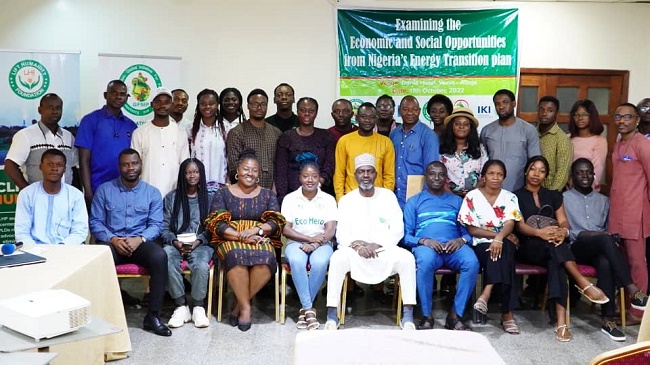A network of civil society organisations that are promoting the just transition agenda has called on the Government to design new climate-sensitive strategies to successfully implement Nigeria’s Energy Transition Plan (ETP) and achieve its net-zero target by 2060.

Making the call at a workshop organised by the Global Initiative for Food Security and Ecosystem Preservation (GIFSEP) on Tuesday, October 11, 2022, in Abuja, the group described the plan as a fantastic tool that if well implemented has the potential to transform the energy sector and accelerate investment activities in the country.
While giving his opening remark at the event, the Programme Officer of GIFSEP, Mr. Joseph Ibrahim, informed the participants that his organisation brought them together to brainstorm on the Economic and Social Opportunities in the ETP, its loopholes, and search for ways to mobilise support for its successful implementation.
“We want to foster synergy and inspire the interest of relevant stakeholders to effectively monitor and support the implementation of the just transition plan,” he said.
Ibrahim hinted that the meeting is also expected to help fathom how Nigeria can raise resources and play her leadership role of championing the net-zero initiative across Africa.
He listed the Hope Free Nigeria campaign which has led to the suspension of the coal mining permits, and the Climate Change Act which is building momentum with the operationalisation of the Council as some of the activities that GIFSEP is implementing to promote the country’s just transition arrangement.
In his review of the ETP, Professor Shuaib Hassan lauded the economic potential of the plan which he said has the capacity to create about 340,000 jobs by 2030 and 840,000 jobs by 2060.
Prof. Hassan, who is the Director of the Centre for Environmental Studies at the University of Abuja, believes that the transition process presents a unique opportunity to truly achieve low carbon and rapid development in Africa’s largest economy.
He underlined the provision of a $2 billion de-risking instrument, as well as the $300 million proposed for the transmission and distribution of energy as other incentives and investment opportunities captured in the plan to encourage private sector participation.
However, despite all these sound promises that are articulated in the energy transition draft, it is still subject to many economic barriers, such as the capital cost of renewable energy technologies and infrastructure investment, he said.
The market and environmental costs of the different energy sources, as well as the day-to-day management of the sector, are some of the other obstacles the scholar wants the plan to address.
So, to confront this problem, he said attention must be drawn to the $23 billion investment opportunities anticipated in the plan for financiers, donors, and other partners. It is also important for the Government to fulfill her $10 billion pledge to kick-start the implementation of this project.
Prof. Hassan, who lamented the epileptic supply of electricity across the nation, said “life will be much easier for the common man if these other alternative sources of energy proposed in the plan are available”.
Therefore, he urged that the plan should be prudently executed to promote a low-carbon economy and foster Nigeria’s net-zero ambition by 2060.
On his part, the Executive Secretary of Lift Humanity Foundation (LHF), Pius Oko, said it was vital to enhance the understanding of non-state actors to help them push for the implementation of the plan so that it can be realistic within Nigeria’s context.
This knowledge, he explained, is very essential to inform their actions as CSOs and build strategies to truly ensure justice in the nation’s transition to a low-carbon economy.
“So, these are our expectations,” Oko said, to ensure accountability which is a major concern in the country.
He identified the collection of accurate data, capacity building, and stakeholders’ collaboration as some of the areas that CSOs must pay attention to successfully deliver the nation’s growth objectives and just transition pathway.
By Etta Michael Bisong, Abuja
